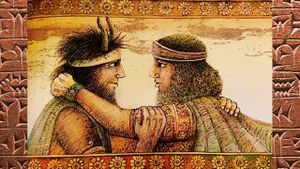Before beginning your work each week, read through the whole lesson so you know what to expect and understand what’s expected. Each tab corresponds to a lesson. All assignments are contained therein. Any questions should be posted to the class forum, and be sure to read my weekly feedback. |
| L1 | L2 | L3 | L4 | L5 | L6 | L7 |
August 19 – September 1: The Epic of Gilgamesh
Our first text is one of the oldest literary expressions, but some of its themes are remarkably contemporary.
Our editor writes:
| “ | [Gilgamesh is a] moving depiction of the bonds of friendship, of the quest for worldly renown, and of the tragic attempt to escape that death which is the common fate of humanity has a timeless resonance and appeal. Yet despite this immediate recognition of something profoundly familiar there is, because of this millennial gap in the history of its transmission, a strangeness and remoteness about the work that strikes us in virtually every line.[1] | ” |
Lesson Instructions and Explanation
|
|---|
|
Generally to avoid confusion, I have tried to make all lessons work the same way. Each lesson will have its weekly section presented in a chart. Work your way from left to right. Open links in tabs, so you don’t lose track of this page. DueThis is the date this sections’s work is due. Complete everything in the row before 11:59:59 pm on this date. ReadThese are the readings for this section. Read them carefully, taking notes as you do. I recommend reading from a book or on paper, as you can highlight an annotate as you progress. This will help you in the next sections. DoThis section will usually be a reading quiz on what you just read, so be sure to take it while the reading is fresh in your mind. However, it may also include other assignments or activities that must be accomplished. WriteMost writing will be on the class forum. This section will contain instructions and guidance for completing your writing. Often, this will link to a series of discussion prompts for the text you’re reading. Choose one prompt, or thread, to answer, or create your own post (especially if there are none there you can or want to respond to) by clicking + New Topic. I’m looking for your engagement here, so aim for a single longish post and a shorter response to someone else’s post. Using secondary sources correctly for support will always earn you more points. Be sure you’re following the conventions outlined in and the guidelines in . TestThe test will be the last activity. It will test your knowledge of the entire lesson’s materials. Take this only after you have accomplished everything else in the lesson. The idea here is that you show me what you learned about the all of the lesson’s material. Please write in complete sentences and give enough detail to answer the questions. Your answers should convince me that you have learned and thought about the materials. |
| Due | Read | Do | Write | Test |
|---|---|---|---|---|
| 08/25 |
|
- | ||
| 09/01 |
|
Tip: Remember, you can always get assistance with anything on the class forum. If you need assistance with something more general, try the help forum. For course content assistance, see the study guides. ⚔️ |
Notes
- ↑ Lawall, Sarah; Mack, Maynard, eds. (1999). The Norton Anthology of World Masterpieces: The Western Tradition. 1 (Seventh ed.). New York: W. W. Norton & Company. p. 16.
- ↑ All course texts are available as PDFs on the forum for download.
| 🕒 08-13-2020 | 📆 Make an Appointment | 💬 Ask a Question | 📣 Leave Feedback |

